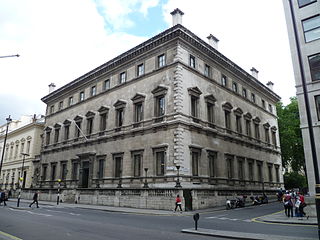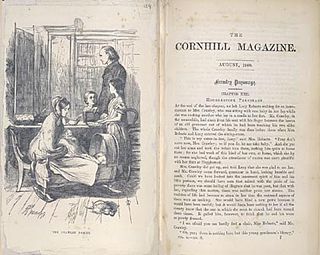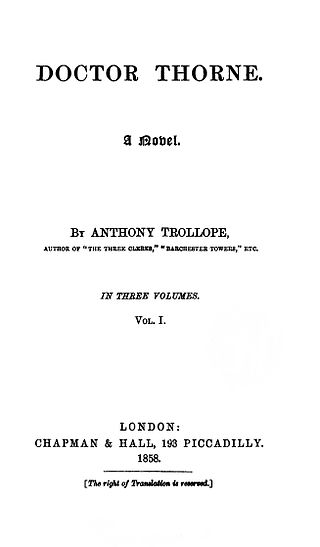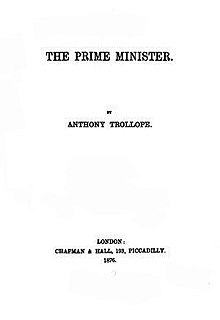
Anthony Trollope was an English novelist and civil servant of the Victorian era. Among his best-known works is a series of novels collectively known as the Chronicles of Barsetshire, which revolves around the imaginary county of Barsetshire. He also wrote novels on political, social, and gender issues, and other topical matters.

Sarah Churchill, Duchess of Marlborough, Princess of Mindelheim, Countess of Nellenburg, was an English courtier who rose to be one of the most influential women of her time through her close relationship with Anne, Queen of Great Britain. The Duchess of Marlborough's relationship and influence with Anne were widely known, and leading public figures often turned their attentions to her, hoping for favour from Anne.

The Reform Club is a private members' club, owned and controlled by its members, on the south side of Pall Mall in central London, England. As with all of London's original gentlemen's clubs, it had an all-male membership for decades, but it was one of the first all-male clubs to change its rules to include the admission of women on equal terms in 1981. Since its foundation in 1836, the Reform Club has been the traditional home for those committed to progressive political ideas, with its membership initially consisting of Radicals and Whigs. However, it is no longer associated with any particular political party, and it now serves a purely social function.

Framley Parsonage is a novel by English author Anthony Trollope. It was first published in serial form in the Cornhill Magazine in 1860, then in book form in April 1861. It is the fourth book in the Chronicles of Barsetshire series, preceded by Doctor Thorne and followed by The Small House at Allington.

Phineas Finn is a novel by Anthony Trollope and the name of its leading character. The novel was first published as a monthly serial from 1867 to 1868 and issued in book form in 1869. It is the second of the "Palliser" series of novels. Its sequel, Phineas Redux, is the fourth novel in the series.

Phineas Redux is a novel by Anthony Trollope, first published between 1873 and 1874 as a serial in The Graphic. It is the fourth of the "Palliser" series of novels and is a sequel to the second book of the series, Phineas Finn.

The Duke's Children is a novel by Anthony Trollope, first published between 1879 and 1880 as a serial in All the Year Round. It is the sixth and final novel of the Palliser series. In 2020, the original text of The Duke's Children was restored for publication of a new edition led by editor Steven Amarnick.

The Eustace Diamonds is a novel by Anthony Trollope, first published between 1871 and 1873 as a serial in the Fortnightly Review. It is the third of the "Palliser" series of novels, though the characters of Plantagenet Palliser and his wife Lady Glencora are only in the background.
Disestablishmentarianism is a movement to end the Church of England's status as an official church of the United Kingdom.

John Russell, 6th Duke of Bedford,, known as Lord John Russell until 1802, was a British Whig politician who notably served as Lord Lieutenant of Ireland in the Ministry of All the Talents. He was the father of Prime Minister John Russell, 1st Earl Russell.

Frances Milton Trollope, also known as Fanny Trollope, was an English novelist who wrote as Mrs. Trollope or Mrs. Frances Trollope. Her book, Domestic Manners of the Americans (1832), observations from a trip to the United States, is the best known.

Doctor Thorne is a novel by the English author Anthony Trollope, published in 1858. It is the third book in his Chronicles of Barsetshire series, between Barchester Towers and Framley Parsonage. The idea of the plot was suggested to Trollope by his brother Thomas. Michael Sadleir places it as one of the five best of Trollope's novels and the best of the Barsetshire novels.

Can You Forgive Her? is a novel by Anthony Trollope, first published in serial form in 1864 and 1865. It is the first of six novels in the Palliser series, also known as the Parliamentary Novels.

The Bedchamber crisis was a constitutional crisis that occurred in the United Kingdom between 1839 and 1841. It began after Whig politician William Lamb, 2nd Viscount Melbourne declared his intention to resign as Prime Minister of the United Kingdom after a government bill passed by a very narrow margin of only five votes in the House of Commons. The crisis occurred very early in the reign of Queen Victoria and involved her first change of government. She was partial to Melbourne, and resisted the requests of his rival Robert Peel to replace some of her ladies-in-waiting, who were primarily from Whig-aligned families, with Conservative substitutes as a condition for forming a government. Following a few false moves toward an alternative Conservative prime minister and government, Melbourne was reinstated until the 1841 election, after which Peel was appointed Prime Minister and Victoria conceded to the replacement of six of her ladies-in-waiting.
The Palliser novels are six novels written in series by Anthony Trollope. They were more commonly known as the Parliamentary novels prior to their 1974 television dramatisation by the BBC broadcast as The Pallisers. Marketed as "polite literature" during their initial publication, the novels encompass several literary genres including: family saga, bildungsroman, picaresque, as well as satire and parody of Victorian life, and criticism of the British government's predilection for attracting corrupt and corruptible people to power.

The Pallisers is a 1974 BBC television adaptation of Anthony Trollope's Palliser novels. Set in Victorian era England with a backdrop of parliamentary life, Simon Raven's dramatisation covers six novels and follows the events and characters over two decades.
Women Pleased is a late Jacobean era stage play, a tragicomedy by John Fletcher that was originally published in the first Beaumont and Fletcher folio of 1647.
The American Senator is a novel written in 1877 by Anthony Trollope. Although not one of Trollope's better-known works, it is notable for its depictions of rural English life and for its many detailed fox hunting scenes. In its anti-heroine, Arabella Trefoil, it presents a scathing but ultimately sympathetic portrayal of a woman who has abandoned virtually all scruples in her quest for a husband. Through the eponymous Senator, Trollope offers comments on the irrational aspects of English life.

The Claverings is a novel by Anthony Trollope, written in 1864 and published in 1866–67. It is the story of a young man starting out in life, who must find himself a profession and a wife; and of a young woman who makes a marriage of convenience and must accept the consequences of her decision.
"Tell it to the Marines" is an English-language idiom, originally with reference to Britain's Royal Marines, connoting that the person addressed is not to be believed. The phrase is an anapodoton – the full phrase is "tell it to the marines because the sailors won't believe you", but only the first clause is usually given, standing for the whole. The idiom depends on its implication that marines, unlike the speaker, will gullibly believe nonsense.















